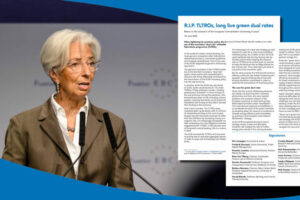Open letter to the ECB: RIP TLTROs, long live dual rates

In an open letter to the European Central Bank (ECB), experts in banking and monetary policy urge the ECB to adopt a “dual rate” strategy by introducing a lower interest rates to encourage banks to increase green lending.
This letter was coordinated in the context of my former role as Executive Director of Positive Money Europe.
In response to inflation rising to record high levels of 8.1% in May, central banks globally are raising interest rates. However many experts fundamentally disagree with this approach given the current situation is different from the usual economic textbook, where inflation is taught to be a consequence of an excess of money supply in the economy.
Instead, today’s inflation is due to geopolitical shocks such as the war in Ukraine, rising oil and gas prices, and supply chain bottlenecks due the rapid reopening of economies after the pandemic. About half of the current inflation dynamics can be attributed to energy prices alone. By raising interest rates now, the risk is that the ECB will simply trigger a recession, creating more unemployment, while not having any effect at all on the energy prices.
The ECB must consider alternative solutions, which is why I have coordinated this open letter (pdf) to the European Central Bank, together with experts and economists working in the banking sector. The letter was released in exclusive via Bloomberg and communicated directly to members of the ECB Governing Council.
“The complexity of this new conjuncture requires a more sophisticated response than simply raising interest rates across the board.” we told the ECB. Instead we advoate the implementation of “Green TLTROs” whereby the ECB would only offer banks a preferential interest rate when commercial banks meet certain conditions, for example if they lend to energy-efficiency renovation projects.
The logic of the proposal is straightforward: to combat the inflation stemming from the volatility of fossil fuel prices, the ECB should design a new lending programme “designed to incentivise banks to increase their lending towards areas of the supply side where shortages are currently sources of inflationary pressure: clean energy production and energy efficiency renovations.”
Signatories of the letter include: Eric Lonergan, Economist & author, Frederik Ducrozet, Senior Economist, Pictet Wealth Management, Stanislas Jourdan, Executive Director, Positive Money Europe, Rens Van Tilburg, Director, Sustainable Finance Lab at Utrecht University, Seraina Grunewald, Professor European and Comparative Financial Law, Radboud University, Barbara Baarsma, Director, Rabo Carbon Bank, Professor Applied Economics, University of Amsterdam, Harald Benink, Professor Banking and Finance, Tilburg University, Carsten Brzeski, Global Head of Macro Research ING and Chief Economist ING Germany, Dirk Schoenmaker, Professor, Erasmus University Rotterdam, Louis Harreau, Economist, Crédit Agricole Corporate and Investment Bank, Sandra Phlippen, Chief economist, ABN AMRO Bank and assistant professor at Erasmus School of Economics, Nick Kounis, Head of financial markets and sustainability research, ABN AMRO Bank
This post is also available in: French
